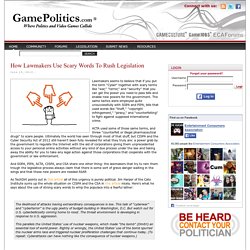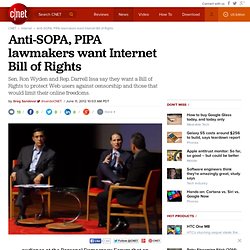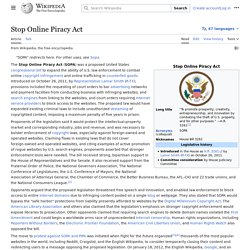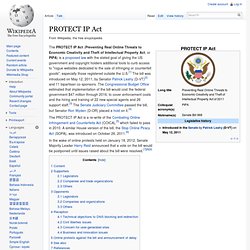

How Lawmakers Use Scary Words To Rush Legislation. Lawmakers seems to believe that if you put the term "Cyber" together with scary terms like "war," "terror," and "security" that you can get the power you need to pass bills and enable new powers for the government.

The same tactics were employed quite unsuccessfully with SOPA and PIPA, bills that used words like "theft," "copyright infringement," "piracy," and "counterfeiting" to fight against supposed international crime. ACTA used some of those same terms, and threw "counterfeit or illegal pharmaceutical drugs" to scare people.
And SOPA, PIPA, ACTA, CISPA, and CSA share one other thing: the lawmakers that try to ram them trough the legislative process always claim that there is some sort of grave danger waiting in the wings and that these new powers are needed ASAP. As TechDirt points out in this article all of this urgency is purely political. Anti-SOPA, PIPA lawmakers want Internet Bill of Rights. The two lawmakers who spearheaded a protest in January against controversial antipiracy legislation said today that they want the country to adopt an Internet Bill of Rights.

Sen. Ron Wyden (D-Ore.) and Rep. Darrell Issa (R-Calif.), said today at the Personal Democracy Forum 2012 in New York that the country needs a way to guarantee citizens their Internet freedoms. "What we need is a way to measure how we're going to ensure the voice of [Internet] networks is protected," Wyden said during an interview the two lawmakers gave to Andrew Rasiej, an entrepreneur and founder of the Personal Democracy Forum. Issa listed some of what he and Wyden would like to see in a Web Bill of Rights. Such a document would state that all Internet users: --Have the right to use the Web ("Freedom") --Have the right to use the Web without censorship or obstruction ("Open") --Should be treated equally while using the Web, an obvious nod at Net Neutrality ("Equality")
Oh my God, entertainment industry people are still pitching for SOPA. You'd think that the proponents of SOPA[1] would give up that legislative dead parrot's ghost. But they're still doing the rounds on radio and in print, claiming that millions of Americans were 'duped' into opposing their harmless little internet censorship law. The fresh (!) Talking points go like this: Wikipedia, Reddit, Boing Boing and others 'lied' to the public about what SOPA was in the crucial final moments, 'abused our power' by going dark for a day, and thereby tricked legislators and the public into turning on a much-needed new law. What rot.
First, the facts of SOPA's sloppy definitions, domain takedown provisions and weakening of safe harbor protections are are very well-known; this renewed insistence that everyone misunderstood them is gaslighting performance art. Second, the claim that blanking our websites was an 'abuse' says much about how corporate lobbyists view free expression: as something to be regulated like a rent or privilege. Would you hold still, please, sir? 1. Internet pirates winning the war on SOPA with "Tribler"
SOPA / PIPA. Stop Online Piracy Act. Proponents of the legislation said it would protect the intellectual-property market and corresponding industry, jobs and revenue, and was necessary to bolster enforcement of copyright laws, especially against foreign-owned and operated websites.

Claiming flaws in present laws that do not cover foreign-owned and operated websites, and citing examples of active promotion of rogue websites by U.S. search engines, proponents asserted that stronger enforcement tools were needed. Opponents claimed that the proposed legislation threatened free speech and innovation, and enabled law enforcement to block access to entire internet domains due to infringing content posted on a single blog or webpage. They expressed concerns that SOPA would bypass the "safe harbor" protections from liability presently afforded to websites by the Digital Millennium Copyright Act. Overview[edit] The originally proposed bill would allow the U.S. On December 12, 2011 a revised version of the bill was tabled. PROTECT IP Act. The PROTECT IP Act is a re-write of the Combating Online Infringement and Counterfeits Act (COICA),[5] which failed to pass in 2010.

A similar House version of the bill, the Stop Online Piracy Act (SOPA), was introduced on October 26, 2011.[6] In the wake of online protests held on January 18, 2012, Senate Majority Leader Harry Reid announced that a vote on the bill would be postponed until issues raised about the bill were resolved.[7][8][9] Content[edit] The bill defines infringement as distribution of illegal copies, counterfeit goods, or anti-digital rights management technology.
Infringement exists if "facts or circumstances suggest [the site] is used, primarily as a means for engaging in, enabling, or facilitating the activities described Supporters[edit] Legislators[edit] The PROTECT IP Act has received bipartisan support in the Senate, with introduction sponsorship by Senator Patrick Leahy (D-VT), and, as of December 17, 2011, co-sponsorship by 40 Senators.[20] The U.S.